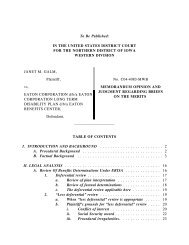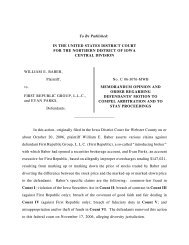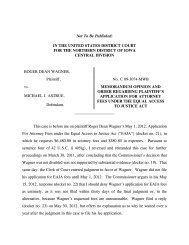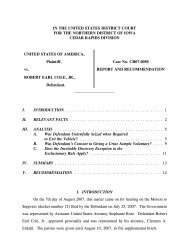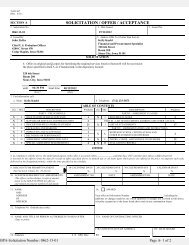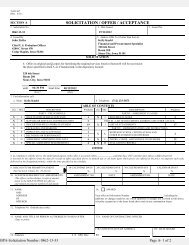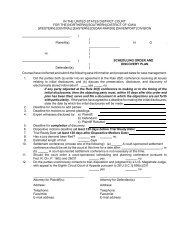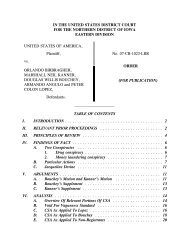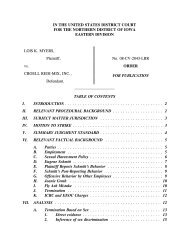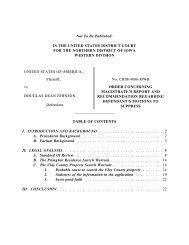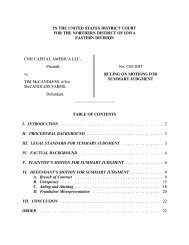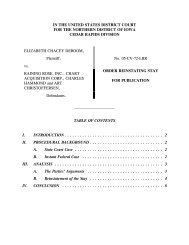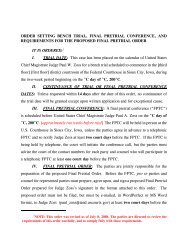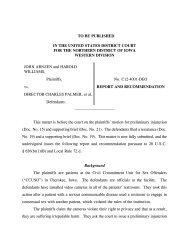Shannon v. Koehler - Northern District of Iowa
Shannon v. Koehler - Northern District of Iowa
Shannon v. Koehler - Northern District of Iowa
You also want an ePaper? Increase the reach of your titles
YUMPU automatically turns print PDFs into web optimized ePapers that Google loves.
<strong>of</strong> force was reasonable because they demonstrate the severity <strong>of</strong> the crime at issue during<br />
the arrest. Thus, the names <strong>of</strong> the charges are admissible.<br />
Turning to the admissibility <strong>of</strong> <strong>Shannon</strong>’s conviction, the Supreme Court has also<br />
identified “whether [the suspect] is actively resisting arrest” as a relevant factor in<br />
determining the reasonableness <strong>of</strong> an <strong>of</strong>ficer’s use <strong>of</strong> force. Graham, 490 U.S. at 396.<br />
The Eighth Circuit Court <strong>of</strong> Appeals has held that a conviction for a crime, such as<br />
interference with <strong>of</strong>ficial acts or assault <strong>of</strong> an <strong>of</strong>ficial, which occurs during an alleged use<br />
<strong>of</strong> excessive force, is relevant evidence in determining the reasonableness <strong>of</strong> the <strong>of</strong>ficial’s<br />
conduct. See Grant v. Farnsworth, 869 F.2d 1149, 1151 (8th Cir. 1989) (finding, where<br />
an <strong>Iowa</strong> man was convicted <strong>of</strong> interference with <strong>of</strong>ficial acts and then sued for excessive<br />
force arising from the same incident, that “[e]vidence <strong>of</strong> Grant’s conviction for<br />
interference with <strong>of</strong>ficial acts is relevant to this action because it precludes the relitigation<br />
<strong>of</strong> the facts and issues that were necessary for the state court jury to convict Grant.” (citing<br />
Oldham v. Pritchett, 599 F.2d 274, 279 (8th Cir. 1979))); see also Cummings v. Malone,<br />
995 F.2d 817, 825 (8th Cir. 1993) (concluding, where plaintiff was convicted under<br />
Missouri law <strong>of</strong> assaulting an <strong>of</strong>ficial and later sued that <strong>of</strong>ficial for excessive force arising<br />
from the same incident, that “refusing to allow appellants to introduce Cummings’ prior<br />
conviction would improperly allow him to contest in this case a fact conclusively decided<br />
against him in the earlier criminal case.” (citing Grant, 869 F.2d at 1151)). But see<br />
Henderson v. Munn, 439 F.3d 497, 500 (8th Cir. 2006) (noting, although the Eighth<br />
Circuit Court <strong>of</strong> Appeals did not reach this issue for lack <strong>of</strong> jurisdiction, that the district<br />
court had found that, under Arkansas law, the plaintiff was not estopped from arguing that<br />
he did not resist arrest in his subsequent § 1983 case, even after he was convicted <strong>of</strong><br />
resisting arrest and obstructing governmental operations).<br />
23



